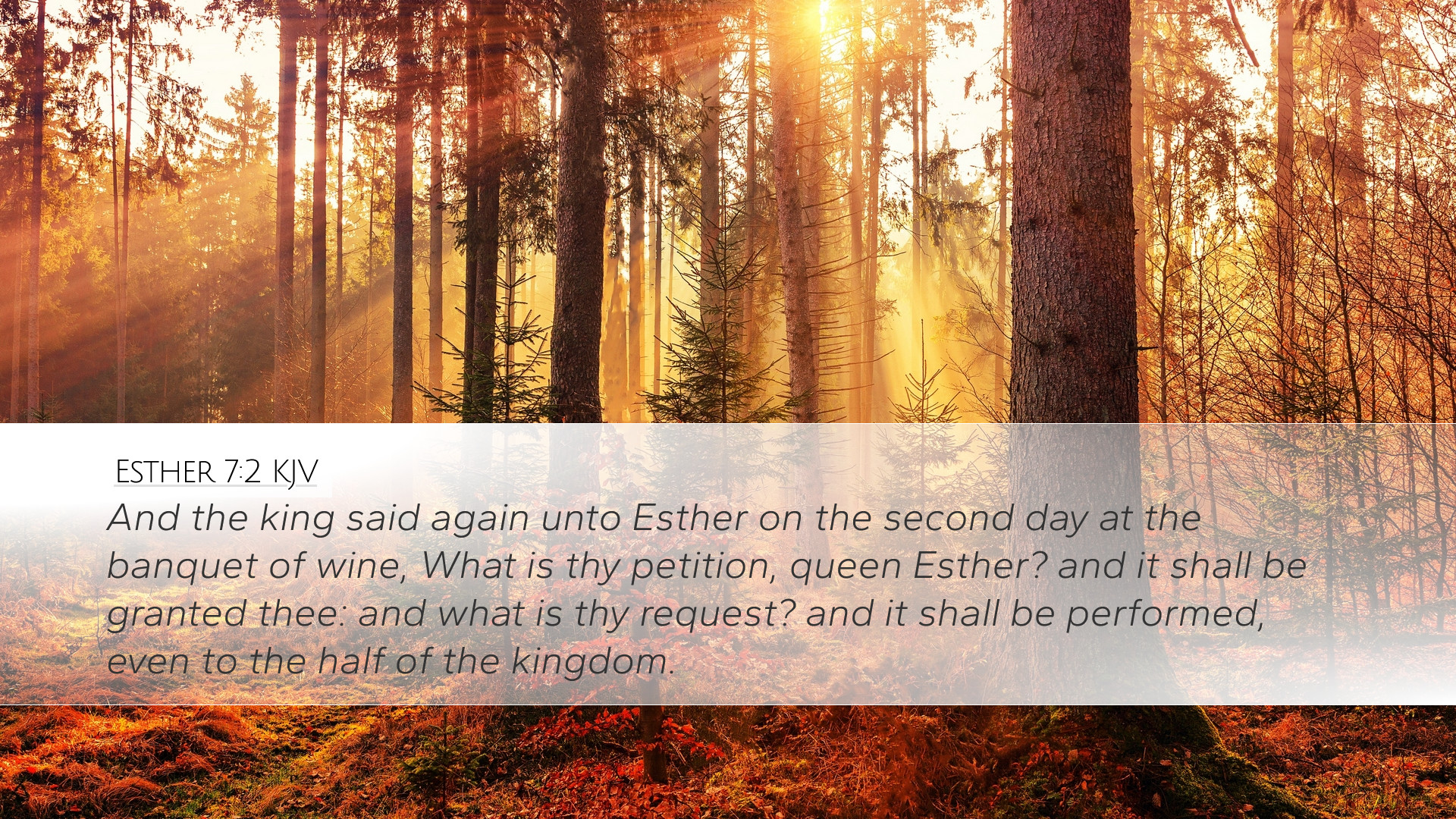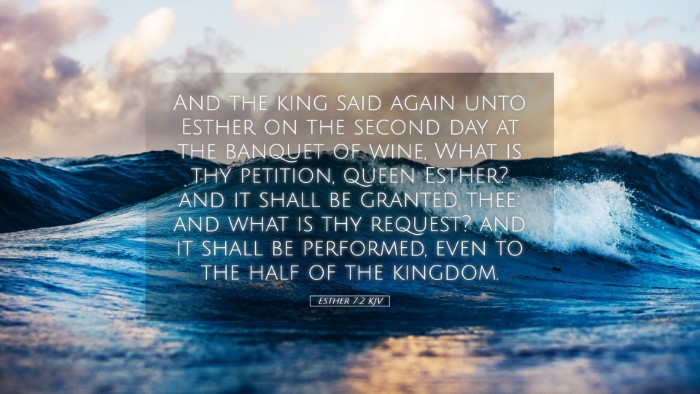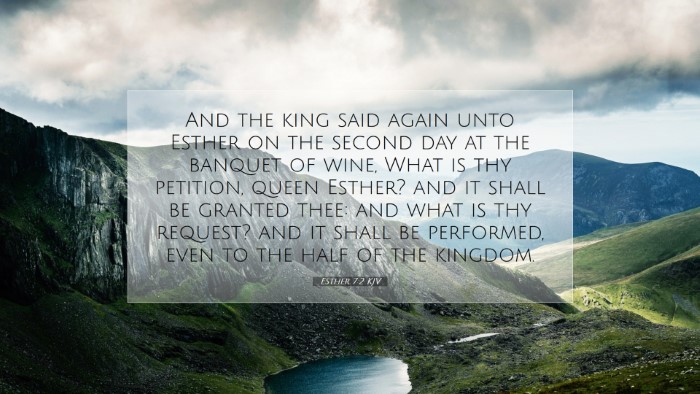Old Testament
Genesis Exodus Leviticus Numbers Deuteronomy Joshua Judges Ruth 1 Samuel 2 Samuel 1 Kings 2 Kings 1 Chronicles 2 Chronicles Ezra Nehemiah Esther Job Psalms Proverbs Ecclesiastes Song of Solomon Isaiah Jeremiah Lamentations Ezekiel Daniel Hosea Joel Amos Obadiah Jonah Micah Nahum Habakkuk Zephaniah Haggai Zechariah MalachiEsther 7:2
Esther 7:2 KJV
And the king said again unto Esther on the second day at the banquet of wine, What is thy petition, queen Esther? and it shall be granted thee: and what is thy request? and it shall be performed, even to the half of the kingdom.
Esther 7:2 Bible Commentary
Bible Commentary on Esther 7:2
Verse Context: Esther 7:2 reads: "And the king said again unto Esther on the second day at the banquet of wine, What is thy petition, Queen Esther? and it shall be granted thee: and what is thy request? even to the half of the kingdom it shall be performed."
Insights from Matthew Henry
Matthew Henry emphasizes the significance of the king's repeated question to Esther. He notes that this inquiry not only illustrates the king's favor towards Esther but also his genuine concern for her well-being. Henry observes that the context of a banquet, particularly one involving wine, signifies a time of joy, openness, and intimacy, a backdrop that enhances the weight of Esther's impending revelation.
Henry further expounds that the king’s willingness to grant Esther's request, even to “the half of the kingdom," highlights his generosity and sets a remarkable stage for Esther’s boldness in her approach. This phrase is often understood as hyperbole, indicating the king's readiness to fulfill Esther's desires, which parallels God’s own readiness to listen to the pleas of His people.
Insights from Albert Barnes
Albert Barnes offers a detailed cultural context surrounding Esther's position and the significance of her request. He notes that the king’s rhetorical question reveals his expectation of favor and is pivotal for relation dynamics in the Persian court. Esther's position as queen puts her in a unique, yet precarious, situation given the court's politics and the recent decree against the Jews.
Barnes elucidates that Esther’s courage in coming forward with her petition to the king, while risking her own safety, exemplifies her faith and resolve. Her dialogue with the king in this moment reflects the larger themes of providence and the divine orchestration of events. Barnes underscores that her adherence to a strategy, including the careful timing of her revelations, teaches valuable lessons about wisdom and patience in spiritual matters.
Insights from Adam Clarke
Adam Clarke interprets the phrase "What is thy petition, Queen Esther?" as an invitation laden with hope and possibility. Clarke argues that the king's inquiry is significant within the framework of Jewish identity and the protective narrative for Jews found throughout the Book of Esther. He suggests that this moment serves as a pivotal point where the queen has the opportunity to intercede on behalf of her people.
Clarke highlights the cultural customs at the royal banquet, noting that the setting provides Esther a platform to present her heartfelt concerns safely. He takes special note of the power dynamics at play, discussing how Esther's initial restraint in voicing her request until the opportune moment is a testament to her wisdom. This serves as an important model for believers who navigate complex relationships and leadership challenges.
Theological Reflection
The commentary on Esther 7:2 collectively challenges readers to reflect on the nature of divine providence and the importance of strategic action in prayer. It encourages pastors and theologians to think about the intentionality behind their asks of God, reminding them of the perfect timing imbued in God’s plans. The parallels drawn from Esther's boldness to contemporary Christian faith underscore the call for courage in advocating for justice.
- Courage in Advocacy: Esther models how to bravely stand for one’s beliefs amidst opposition.
- Divine Timing: The importance of waiting for the right moment before making significant requests.
- Generosity of the King: A reflection of God’s nature as one who asks for our petitions and is eager to respond.
Application for Today’s Believers
In conclusion, the interpretation of Esther 7:2 prompts believers to engage in prayer with boldness while exercising wisdom. The king's provision and Esther's strategic communication provide a framework for understanding how believers can approach God with their requests.
For pastors and leaders, this passage serves as a reminder of their role in guiding their congregations through times of distress, encouraging them to seek out opportunities to advocate for justice, just as Esther advocated for her people. In the contemporary context, Esther’s example could lead to discussions on how to face societal issues with faith and courage.


